Unit 9Have you ever been to a museum Section A 1a-2d课件+音频(共41张PPT)人教版英语八年级下册
文档属性
| 名称 | Unit 9Have you ever been to a museum Section A 1a-2d课件+音频(共41张PPT)人教版英语八年级下册 |
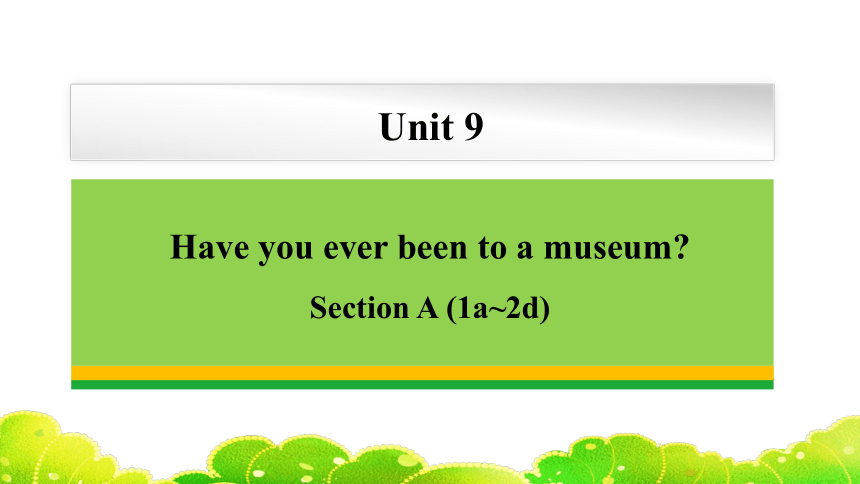
|
|
| 格式 | pptx | ||
| 文件大小 | 18.6MB | ||
| 资源类型 | 教案 | ||
| 版本资源 | 人教新目标(Go for it)版 | ||
| 科目 | 英语 | ||
| 更新时间 | 2024-01-01 00:00:00 | ||
图片预览

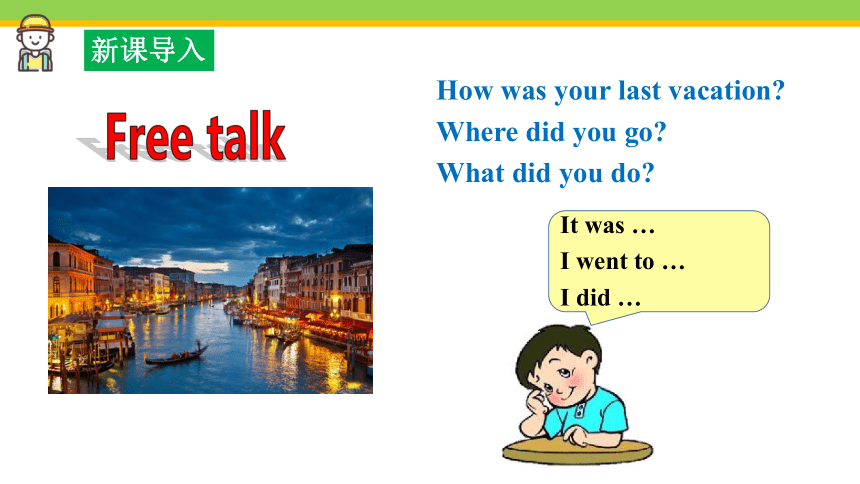
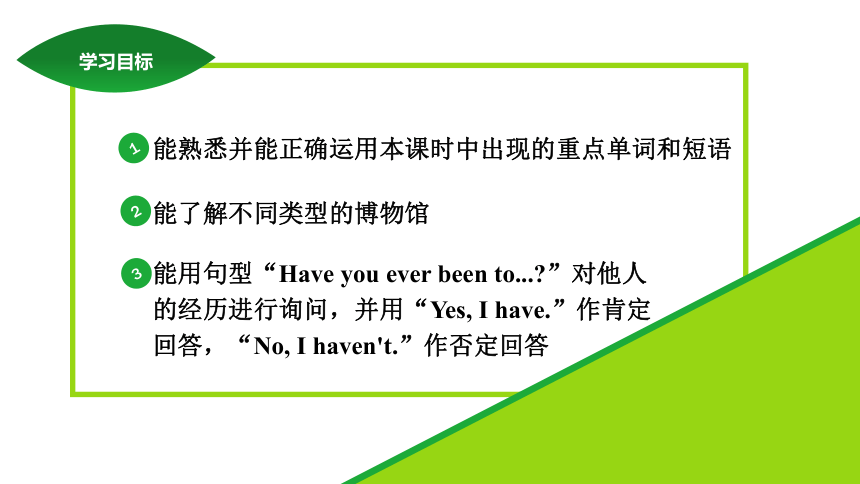

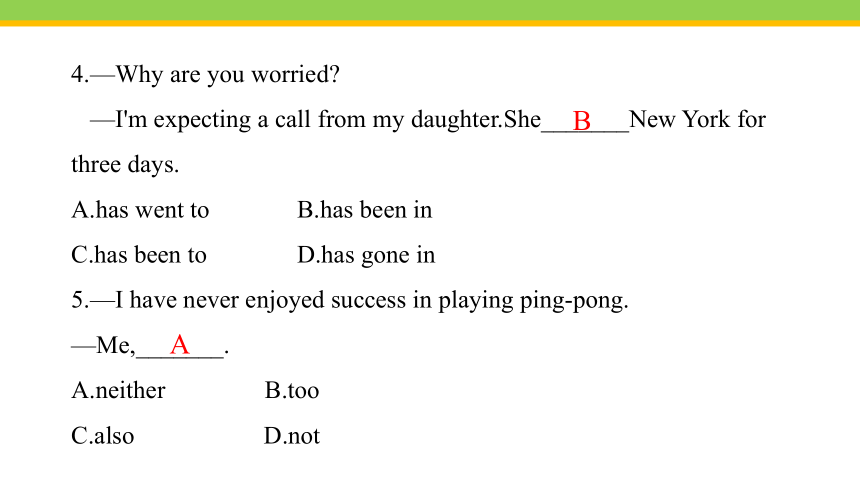
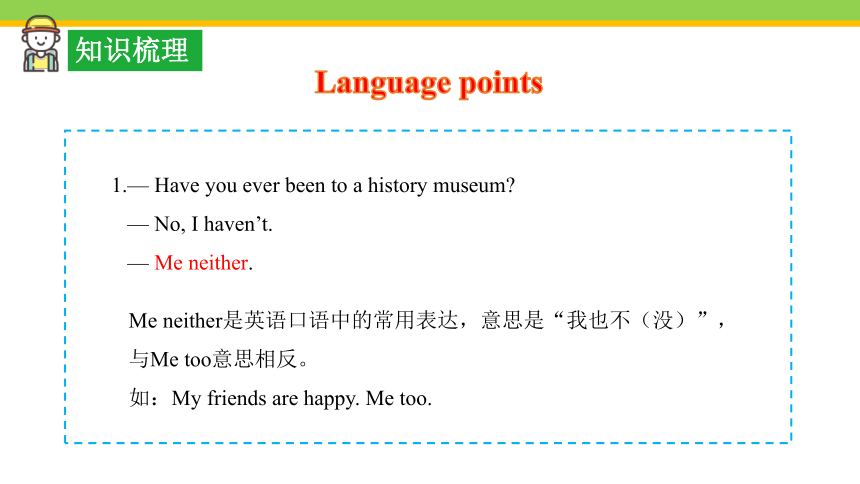
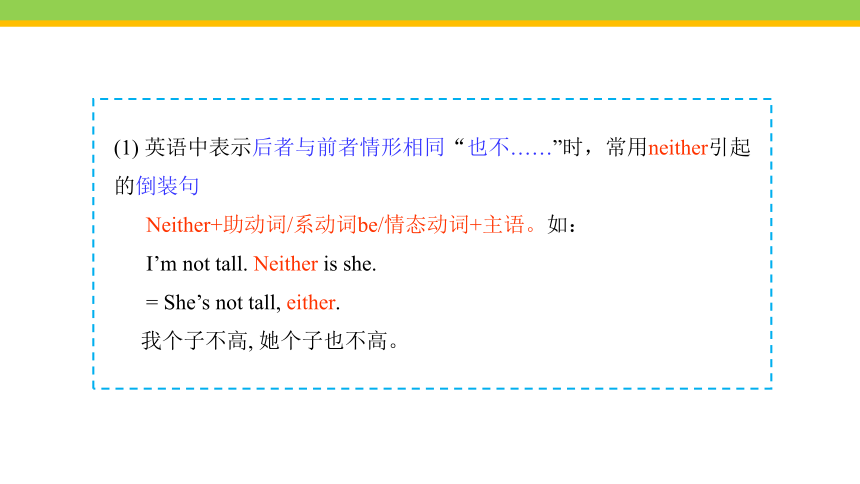
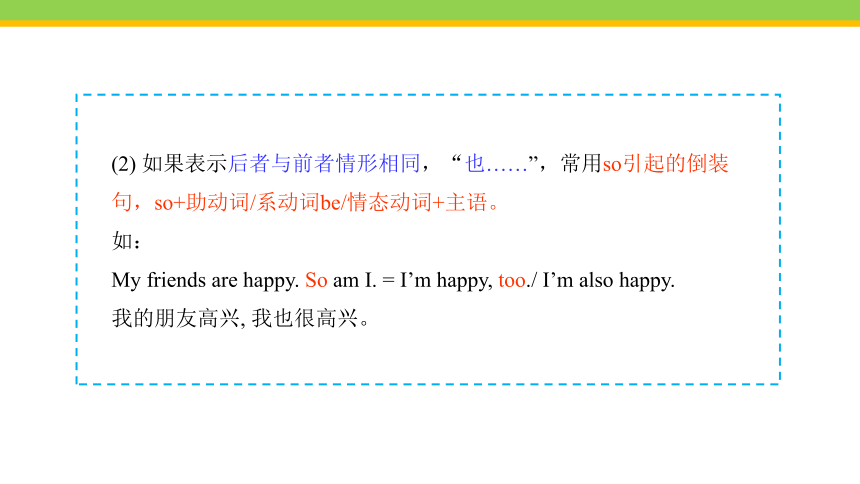
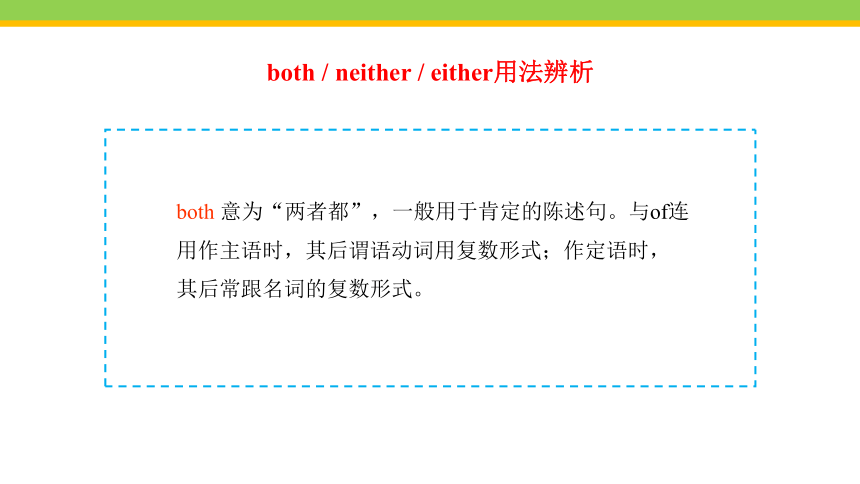
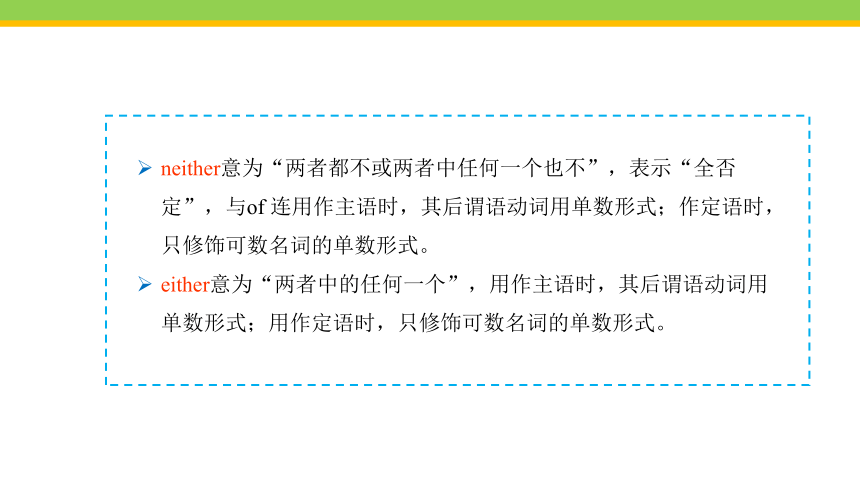
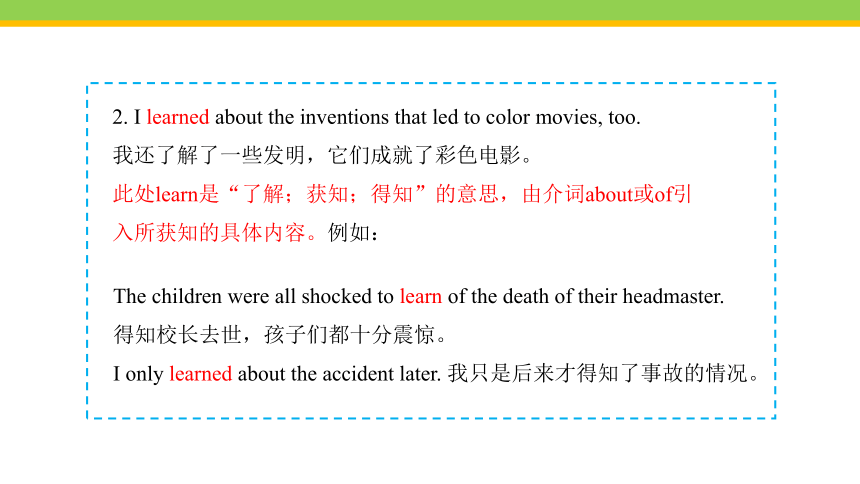
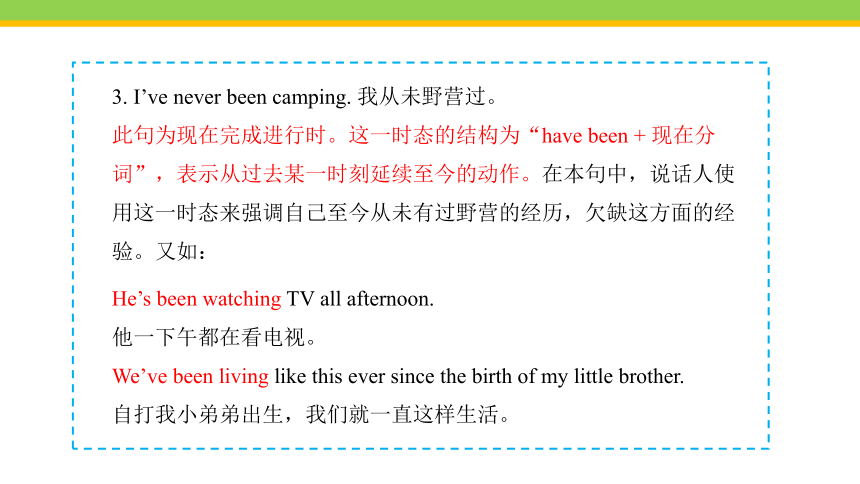
文档简介
(共41张PPT)
Unit 9
Have you ever been to a museum Section A (1a~2d)
新课导入
How was your last vacation
Where did you go
What did you do
Free talk
It was …
I went to …
I did …
2
能了解不同类型的博物馆
1
能熟悉并能正确运用本课时中出现的重点单词和短语
3
能用句型“Have you ever been to... ”对他人的经历进行询问,并用“Yes, I have.”作肯定回答,“No, I haven't.”作否定回答
预习检测
1._______of these two hats looks good on my daughter.Do you have another one
A.Both B.All C.Neither D.None
2. I would like to go_______during my winter vacation.
A.warm somewhere B.anywhere warm
C.warm anywhere D.somewhere warm
3. —Have you_______visited the old house by the river
—No,_______.
A.ever; ever B.ever; never C.never; ever D.never; never
C
B
D
4.—Why are you worried
—I'm expecting a call from my daughter.She_______New York for three days.
A.has went to B.has been in
C.has been to D.has gone in
5.—I have never enjoyed success in playing ping-pong.
—Me,_______.
A.neither B.too
C.also D.not
B
A
知识梳理
Language points
1.— Have you ever been to a history museum
— No, I haven’t.
— Me neither.
Me neither是英语口语中的常用表达,意思是“我也不(没)”,与Me too意思相反。
如:My friends are happy. Me too.
(1) 英语中表示后者与前者情形相同“也不……”时,常用neither引起的倒装句
Neither+助动词/系动词be/情态动词+主语。如:
I’m not tall. Neither is she.
= She’s not tall, either.
我个子不高, 她个子也不高。
(2) 如果表示后者与前者情形相同,“也……”,常用so引起的倒装句,so+助动词/系动词be/情态动词+主语。
如:
My friends are happy. So am I. = I’m happy, too./ I’m also happy.
我的朋友高兴, 我也很高兴。
both / neither / either用法辨析
both 意为“两者都”,一般用于肯定的陈述句。与of连用作主语时,其后谓语动词用复数形式;作定语时,其后常跟名词的复数形式。
neither意为“两者都不或两者中任何一个也不”,表示“全否定”,与of 连用作主语时,其后谓语动词用单数形式;作定语时,只修饰可数名词的单数形式。
either意为“两者中的任何一个”,用作主语时,其后谓语动词用单数形式;用作定语时,只修饰可数名词的单数形式。
2. I learned about the inventions that led to color movies, too.
我还了解了一些发明,它们成就了彩色电影。
此处learn是“了解;获知;得知”的意思,由介词about或of引入所获知的具体内容。例如:
The children were all shocked to learn of the death of their headmaster.
得知校长去世,孩子们都十分震惊。
I only learned about the accident later. 我只是后来才得知了事故的情况。
3. I’ve never been camping. 我从未野营过。
此句为现在完成进行时。这一时态的结构为“have been + 现在分词”,表示从过去某一时刻延续至今的动作。在本句中,说话人使用这一时态来强调自己至今从未有过野营的经历,欠缺这方面的经验。又如:
He’s been watching TV all afternoon.
他一下午都在看电视。
We’ve been living like this ever since the birth of my little brother.
自打我小弟弟出生,我们就一直这样生活。
重点探究
了解不同类型的博物馆
Where did I go
Guess
I have been to shanghai.
I went to Shanghai last year.
There are many fun places in Shanghai!
space museum
I have been to …
amusement park
I have been to …
art museum
I have been to …
history museum
I have been to …
water park
I have been to …
zoo
I have been to …
1a. Which of these places would you like to visit Rank them from 1 (most) to 6 (least).
space museum ________ history museum ________
art museum ________ water park ________
zoo ________ amusement park _______
活动小结
通过以上活动,我们学习了本课时的一些重点单词和短语。比如:游乐场1._______________,水上乐园2.____________,国家科学博物馆3.________________________,太空博物馆4.______________,历史博物馆5._____________, 艺术博物馆6.____________,自然博物馆7.______________, 科学博物馆
8.______________。
当堂检测见DCF课件
amusement park
water park
National Science Museum
space museum
history museum
art museum
nature museum
science museum
用句型“Have you ever been to... ”对他人的经历进行询问
Have you ever been to a space museum
Yes, I have. I have been to ……
No, I haven’t, I have never been to ……
_____you ever_________ a_____
Yes, I______.
Me,______.
Have
been to
have
too
zoo
_____you ever_________ a__________________
No, I________.
Me,_________.
Have
been to
haven't
neither
a nature museum
Have you ever been to a/an…
Yes, I have. / No, I haven’t. How about you
Ask and answer in your group.
So have I./Neither have I.
(Me, too. / Me, neither.)
amusement park
water park
art museum
history museum
space museum
Pair work
1b. Listen. Have these students ever been to these places Check (√) the boxes.
Science museum History museum Art museum Nature museum Space museum
Claudia
Sarah
Listen again and Fill in the blanks.
Sarah:I’m bored, Claudia. Let’s do something interesting.
Claudia:____________________a science museum
Sarah:___________ I went to the National Science Museum last year.
Have you ever been to a history museum
Claudia: _____________
Sarah: Me neither. Let’s go to one tomorrow.
Claudia: Well, that sounds good, but I’m not interested in history.
Sarah: Really I didn’t know that. Well, how about the art museum Have you been to the art museum
Have you ever been to
Yes, I have.
No, I haven’t.
Claudia:I’ve been to the art museum many times.
Sarah:Me, too. But I’d like to go again. Hmm, let’s see…how about the nature museum ________________________
Claudia: So have I. I went there on our last school trip.
Sarah: I know. Let’s go to the space museum._____________________
Claudia:That’s a great idea. I went there last year, but I’d like to go there again.
I’ve been there a few times.
I’ve never been there.
have gone to与have been to的辨析
(1). have been (to) 是现在完成时,意为“曾经去过某地”。强调以前去过某地,现在已经回来了,表示一种经历。常与ever, never, just, twice等词连用。have been 后面加to时,与地点名词连用;不加to时,则与地点副词连用。
例如: I have ever been to Qingdao.我曾经去过青岛。
have gone to与have been to的辨析
(2). have gone (to) 意为“去某地了”,强调到某地去了,但现在不在说话的地方,可能在途中,也可能已经到达某地。
例如:
Tom has gone to Australia.He will come back next week.
汤姆去澳大利亚了。他将在下周回来。
Pair work
1c. Ask and answer questions about the places in 1b.
Practice in pairs like this:
A: Let’s go somewhere different today.
B: OK. Where do you want to go
A: Have you ever been to the space museum
B: No, I haven’t. How about you
A: …
2a. Look at the map of the town. Listen and
circle the places you hear.
2b. Listen again and circle T for true or F for false.
Conversation 1 Conversation 2 Conversation 3
Tina went to the space museum last year. T/F 2. John has never been to the space museum. T/F 3. They are going to take the subway. T/F 1.Linda has been to the amusement park. T/F 2. Linda went to the amusement park yesterday. T/F 3. Linda is going to the amusement park again by bike. T/F 1.Frank had a great time at the water park. T/F
2. Frank’s friend has never been to the water park. T/F
3. Frank and his friend are going skating. T/F
Pair work
两人一组看着教材上2a中的地图,并仿照所给例子编写新的对话。
A:Have you ever been to...
B:Yes, I have./ No, I haven't.
以小组为单位阅读教材上2d中的对话,并思考下列问题。
Group work
(1)What did Anna think of the film museum
(2)What did Jill do last weekend
She thinks it is really interesting.
He camped in the mountains with some friends.
It's really interesting, isn't it
该句是附加疑问句,也叫反意疑问句。该疑问句的结构是由肯定陈述句加简略否定句,或否定陈述句加简略肯定句构成。例如:
(1)Mr.Smith is a doctor, isn’t he
史密斯先生是医生,不是吗
(2)They didn’t go to work yesterday, did they
他们昨天没去上班,对吗
It's a great way to spend a Saturday afternoon.
to spend a Saturday afternoon是动词不定式短语,它修饰前面的名词way,意为“度过星期六上午的方法”。
例如:
It's the best time to go to Beijing.
它是去北京的最佳时间。
活动小结
当堂检测见DCF课件
通过以上活动,我们学习了Have you ever been to... ”对他人的经历进行询问,并用“__________”作肯定回答,“_____________”作否定回答。
Yes, I have.
No, I haven't.
一、按要求改写下列各句。
当堂检测
1. They have bought a computer. (改成否定句)
____________________________________________
2. He has lost his book. (先改成一般疑问句,再作肯定与否定回答)
____________________________________________
____________________________________________
They haven’t bought a computer.
Has he lost his book
Yes, he has. No, he hasn’t.
二、用所给单词的正确形式填空。
1. —I ______ ever _______ (visit) the Great Wall. What about you
—I _______ (visit) it when I was ten years old.
2. Tom __________ (not be) to Disneyland and he ________ (go) there with
his parents this weekend.
3. —Where’s Zhang Peng
—He ________ (go) to our math teacher’s office.
—How soon ____ he _____ (come) back
—In a few minutes, I think.
4. —How long have you been ________ (study) in this school
—For more than two years.
have
visited
visited
hasn’t been
is going
studying
has gone
will
come
课堂总结
Unit 9
Section A (1a~2d)
重点词汇:
_____________________________________________________________________________________________
_______________________________
amusement park
space museum
water park
neither
nature museum
science museum
history museum
art museum
重点句型:
_____________________________________________________________________________________________________________________
______________________________________________________________________________
—Have you ever been to ...?
—Yes, I have /No, I haven’t.
—Me neither. / Me too.
Neither+助动词/系动词be/情态动词+主语.
So+助动词/系动词be/情态动词+主语.
Unit 9
Have you ever been to a museum Section A (1a~2d)
新课导入
How was your last vacation
Where did you go
What did you do
Free talk
It was …
I went to …
I did …
2
能了解不同类型的博物馆
1
能熟悉并能正确运用本课时中出现的重点单词和短语
3
能用句型“Have you ever been to... ”对他人的经历进行询问,并用“Yes, I have.”作肯定回答,“No, I haven't.”作否定回答
预习检测
1._______of these two hats looks good on my daughter.Do you have another one
A.Both B.All C.Neither D.None
2. I would like to go_______during my winter vacation.
A.warm somewhere B.anywhere warm
C.warm anywhere D.somewhere warm
3. —Have you_______visited the old house by the river
—No,_______.
A.ever; ever B.ever; never C.never; ever D.never; never
C
B
D
4.—Why are you worried
—I'm expecting a call from my daughter.She_______New York for three days.
A.has went to B.has been in
C.has been to D.has gone in
5.—I have never enjoyed success in playing ping-pong.
—Me,_______.
A.neither B.too
C.also D.not
B
A
知识梳理
Language points
1.— Have you ever been to a history museum
— No, I haven’t.
— Me neither.
Me neither是英语口语中的常用表达,意思是“我也不(没)”,与Me too意思相反。
如:My friends are happy. Me too.
(1) 英语中表示后者与前者情形相同“也不……”时,常用neither引起的倒装句
Neither+助动词/系动词be/情态动词+主语。如:
I’m not tall. Neither is she.
= She’s not tall, either.
我个子不高, 她个子也不高。
(2) 如果表示后者与前者情形相同,“也……”,常用so引起的倒装句,so+助动词/系动词be/情态动词+主语。
如:
My friends are happy. So am I. = I’m happy, too./ I’m also happy.
我的朋友高兴, 我也很高兴。
both / neither / either用法辨析
both 意为“两者都”,一般用于肯定的陈述句。与of连用作主语时,其后谓语动词用复数形式;作定语时,其后常跟名词的复数形式。
neither意为“两者都不或两者中任何一个也不”,表示“全否定”,与of 连用作主语时,其后谓语动词用单数形式;作定语时,只修饰可数名词的单数形式。
either意为“两者中的任何一个”,用作主语时,其后谓语动词用单数形式;用作定语时,只修饰可数名词的单数形式。
2. I learned about the inventions that led to color movies, too.
我还了解了一些发明,它们成就了彩色电影。
此处learn是“了解;获知;得知”的意思,由介词about或of引入所获知的具体内容。例如:
The children were all shocked to learn of the death of their headmaster.
得知校长去世,孩子们都十分震惊。
I only learned about the accident later. 我只是后来才得知了事故的情况。
3. I’ve never been camping. 我从未野营过。
此句为现在完成进行时。这一时态的结构为“have been + 现在分词”,表示从过去某一时刻延续至今的动作。在本句中,说话人使用这一时态来强调自己至今从未有过野营的经历,欠缺这方面的经验。又如:
He’s been watching TV all afternoon.
他一下午都在看电视。
We’ve been living like this ever since the birth of my little brother.
自打我小弟弟出生,我们就一直这样生活。
重点探究
了解不同类型的博物馆
Where did I go
Guess
I have been to shanghai.
I went to Shanghai last year.
There are many fun places in Shanghai!
space museum
I have been to …
amusement park
I have been to …
art museum
I have been to …
history museum
I have been to …
water park
I have been to …
zoo
I have been to …
1a. Which of these places would you like to visit Rank them from 1 (most) to 6 (least).
space museum ________ history museum ________
art museum ________ water park ________
zoo ________ amusement park _______
活动小结
通过以上活动,我们学习了本课时的一些重点单词和短语。比如:游乐场1._______________,水上乐园2.____________,国家科学博物馆3.________________________,太空博物馆4.______________,历史博物馆5._____________, 艺术博物馆6.____________,自然博物馆7.______________, 科学博物馆
8.______________。
当堂检测见DCF课件
amusement park
water park
National Science Museum
space museum
history museum
art museum
nature museum
science museum
用句型“Have you ever been to... ”对他人的经历进行询问
Have you ever been to a space museum
Yes, I have. I have been to ……
No, I haven’t, I have never been to ……
_____you ever_________ a_____
Yes, I______.
Me,______.
Have
been to
have
too
zoo
_____you ever_________ a__________________
No, I________.
Me,_________.
Have
been to
haven't
neither
a nature museum
Have you ever been to a/an…
Yes, I have. / No, I haven’t. How about you
Ask and answer in your group.
So have I./Neither have I.
(Me, too. / Me, neither.)
amusement park
water park
art museum
history museum
space museum
Pair work
1b. Listen. Have these students ever been to these places Check (√) the boxes.
Science museum History museum Art museum Nature museum Space museum
Claudia
Sarah
Listen again and Fill in the blanks.
Sarah:I’m bored, Claudia. Let’s do something interesting.
Claudia:____________________a science museum
Sarah:___________ I went to the National Science Museum last year.
Have you ever been to a history museum
Claudia: _____________
Sarah: Me neither. Let’s go to one tomorrow.
Claudia: Well, that sounds good, but I’m not interested in history.
Sarah: Really I didn’t know that. Well, how about the art museum Have you been to the art museum
Have you ever been to
Yes, I have.
No, I haven’t.
Claudia:I’ve been to the art museum many times.
Sarah:Me, too. But I’d like to go again. Hmm, let’s see…how about the nature museum ________________________
Claudia: So have I. I went there on our last school trip.
Sarah: I know. Let’s go to the space museum._____________________
Claudia:That’s a great idea. I went there last year, but I’d like to go there again.
I’ve been there a few times.
I’ve never been there.
have gone to与have been to的辨析
(1). have been (to) 是现在完成时,意为“曾经去过某地”。强调以前去过某地,现在已经回来了,表示一种经历。常与ever, never, just, twice等词连用。have been 后面加to时,与地点名词连用;不加to时,则与地点副词连用。
例如: I have ever been to Qingdao.我曾经去过青岛。
have gone to与have been to的辨析
(2). have gone (to) 意为“去某地了”,强调到某地去了,但现在不在说话的地方,可能在途中,也可能已经到达某地。
例如:
Tom has gone to Australia.He will come back next week.
汤姆去澳大利亚了。他将在下周回来。
Pair work
1c. Ask and answer questions about the places in 1b.
Practice in pairs like this:
A: Let’s go somewhere different today.
B: OK. Where do you want to go
A: Have you ever been to the space museum
B: No, I haven’t. How about you
A: …
2a. Look at the map of the town. Listen and
circle the places you hear.
2b. Listen again and circle T for true or F for false.
Conversation 1 Conversation 2 Conversation 3
Tina went to the space museum last year. T/F 2. John has never been to the space museum. T/F 3. They are going to take the subway. T/F 1.Linda has been to the amusement park. T/F 2. Linda went to the amusement park yesterday. T/F 3. Linda is going to the amusement park again by bike. T/F 1.Frank had a great time at the water park. T/F
2. Frank’s friend has never been to the water park. T/F
3. Frank and his friend are going skating. T/F
Pair work
两人一组看着教材上2a中的地图,并仿照所给例子编写新的对话。
A:Have you ever been to...
B:Yes, I have./ No, I haven't.
以小组为单位阅读教材上2d中的对话,并思考下列问题。
Group work
(1)What did Anna think of the film museum
(2)What did Jill do last weekend
She thinks it is really interesting.
He camped in the mountains with some friends.
It's really interesting, isn't it
该句是附加疑问句,也叫反意疑问句。该疑问句的结构是由肯定陈述句加简略否定句,或否定陈述句加简略肯定句构成。例如:
(1)Mr.Smith is a doctor, isn’t he
史密斯先生是医生,不是吗
(2)They didn’t go to work yesterday, did they
他们昨天没去上班,对吗
It's a great way to spend a Saturday afternoon.
to spend a Saturday afternoon是动词不定式短语,它修饰前面的名词way,意为“度过星期六上午的方法”。
例如:
It's the best time to go to Beijing.
它是去北京的最佳时间。
活动小结
当堂检测见DCF课件
通过以上活动,我们学习了Have you ever been to... ”对他人的经历进行询问,并用“__________”作肯定回答,“_____________”作否定回答。
Yes, I have.
No, I haven't.
一、按要求改写下列各句。
当堂检测
1. They have bought a computer. (改成否定句)
____________________________________________
2. He has lost his book. (先改成一般疑问句,再作肯定与否定回答)
____________________________________________
____________________________________________
They haven’t bought a computer.
Has he lost his book
Yes, he has. No, he hasn’t.
二、用所给单词的正确形式填空。
1. —I ______ ever _______ (visit) the Great Wall. What about you
—I _______ (visit) it when I was ten years old.
2. Tom __________ (not be) to Disneyland and he ________ (go) there with
his parents this weekend.
3. —Where’s Zhang Peng
—He ________ (go) to our math teacher’s office.
—How soon ____ he _____ (come) back
—In a few minutes, I think.
4. —How long have you been ________ (study) in this school
—For more than two years.
have
visited
visited
hasn’t been
is going
studying
has gone
will
come
课堂总结
Unit 9
Section A (1a~2d)
重点词汇:
_____________________________________________________________________________________________
_______________________________
amusement park
space museum
water park
neither
nature museum
science museum
history museum
art museum
重点句型:
_____________________________________________________________________________________________________________________
______________________________________________________________________________
—Have you ever been to ...?
—Yes, I have /No, I haven’t.
—Me neither. / Me too.
Neither+助动词/系动词be/情态动词+主语.
So+助动词/系动词be/情态动词+主语.
同课章节目录
- Unit 1 What's the matter?
- Section A
- Section B
- Unit 2 I'll help to clean up the city parks.
- Section A
- Section B
- Unit 3 Could you please clean your room?
- Section A
- Section B
- Unit 4 Why don't you talk to your parents?
- Section A
- Section B
- Unit 5 What were you doing when the rainstorm came
- Section A
- Section B
- Review of Units 1-5
- Unit 6 An old man tried to move the mountains.
- Section A
- Section B
- Unit 7 What's the highest mountain in the world?
- Section A
- Section B
- Unit 8 Have you read Treasure Island yet?
- Section A
- Section B
- Unit 9 Have you ever been to a museum?
- Section A
- Section B
- Unit 10 I've had this bike for three years.
- Section A
- Section B
